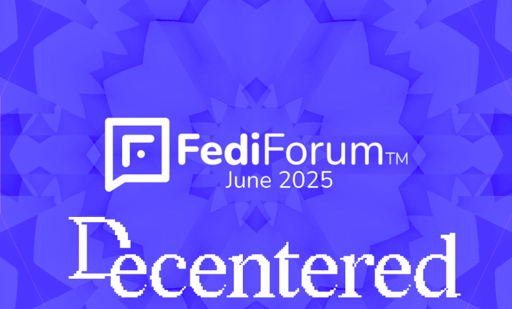Sean Tilley
Former Diaspora core team member, I work on various fediverse projects, and also spend my time making music and indie adventure games!
- 34 Posts
- 28 Comments

 6·3 months ago
6·3 months ago- From what I can tell, there have been successful tests with posting to the Threadiverse. I’m not sure how good this experience actually is on Wafrn yet, but it’s promising: https://community.nodebb.org/topic/5fa12345-e4ff-4da3-8a95-d1ef1c4bd186/wafrn-a-tumblr-clone-that-federates-with-fedi-and-now-also-has-opt-in-native-bluesky/
- I don’t think it will natively support RSS anytime soon. It’s not a bad idea, but I’ve only seen platforms from the Friendica family tree and maybe Emissary supporting this. That being said, a lot of publications are on the Fediverse or Bluesky, and it’s not too complicated to set up an RSS bot?

 3·3 months ago
3·3 months agoOh, I misunderstood, I didn’t realize this related to Tumblr specifically…
Still, it might make some of the dev work easier, if they do end up migrating the backend over to WordPress.

 3·3 months ago
3·3 months agoThat might be more related to what they’re doing with the WordPress-ActivityPub integration, as a way to work around some of the weird limitations WordPress has for representing notifications and activities other than comments. It’s fairly standard for Fediverse stuff.

 2·5 months ago
2·5 months agoNo, the GPL is strictly a software license. Even then, most Fediverse platforms are AGPL at best, which only really deals with modifications to the source code of AGPL projects. Content licensing itself is more nebulous and more complicated.

 1·6 months ago
1·6 months agoI do all of my writing by hand, the old-fashioned way.
So…while biology does account for male and female reproductive systems across a variety of species, they have found that, as they continue to study many different forms of life, that they actually have to keep adjusting the model of what they once thought. Life is weirder, more complex, and accounts for a tremendous amount of variation in how this whole thing works.
I’m not a biologist, there are experts who can speak extremely well on this subject. Within the field of biology, the whole “two sexes” thing is kind of an oversimplification. Even if we just focus on humans and not, say, some form of algae with 500 different sexes, there are plenty of divergent forms of human beings that manifest as some form of intersex, with quite a few different variations.
Even if intersex people are a fraction of a fraction of the population, they are a compelling case study for why things don’t definitively boil down across some kind of sexual binary across the board for absolutely everyone. Heck, even males and females in the traditional sense of sexual dimorphism tend to exhibit traits of the other sex in one way or another.
TL;DR - it’s a huge complicated can of worms, and people who try to shutdown discussion of nonbinary or transgender identities with “there’s only two sexes, it’s just science!” tend to have a grade-school understanding of biology.
To be fair to Johannes, I think he ultimately made the right decision. The main problem lie in communication, and timeliness.
Her comments cover everything from “trans women are mostly autistic boys who have been gaslit” to “there are only two sexes” to “trans people are unfit to play in their gender’s sport.” However, there are far worse comments floating around out there that talk about genital mutilation and all kinds of other heinous shit.
One thought I’ve had about this: for a self-hosted gaming instance, it could be incredibly interesting to take inspiration or code from RomM and perhaps Funkwhale’s user library concept?
Basically, RomM is a server / launcher that supports tons of different platforms, allows you to stream games to the browser, and provide game library access to friends. It could be an extremely compelling building block.

 3·11 months ago
3·11 months agoWe’ve seen this happen a lot with Mastodon instances, where people have various beefs and disagreements, and it sometimes results in people advocating everyone blocks an instance regardless of what actually happened. Unfortunately, people are more likely to hit the block-button based on hearsay than they are to do research on whether the instance is actually a bad actor.
It gets super ugly sometimes, and has been abused in the past.

 1·11 months ago
1·11 months agoServers are hosted and operated by different admins.

 1·11 months ago
1·11 months agoIt’s self-hosted. Originally, Funkwhale was an open source Grooveshark clone, where users uploaded music libraries to stream to various devices. A newer update introduced Channels, where artists could create their own profiles and upload their songs. So, Funkwhale kind of straddles a line between federating user libraries and artist uploads.

 6·11 months ago
6·11 months agoFor the time being, it seems like they’re primarily targeting White Supremacist and Neo-Nazi content, but it’s one of those things where the scope could open up to include a lot of different music subgenres. That being said, the mechanism is purely genre-based, it doesn’t directly target individual artists.

 3·11 months ago
3·11 months agoHey, thanks for sharing this! Yes, we could absolutely use help with writing articles and managing our social media accounts. There’s a lot we try to cover, but we’re a very small team.
I’m just saying, there’s tangible things to point to which explain the current situation, and how we got here. At the end of the day, compromises had to be made to have a working thing in the first place.
We can sit and wring our hands about a piece of software not being open source, but ideological purism doesn’t always get things made. Perfect is the enemy of good.
Besides which, a larger problem is that FOSS devs of critical projects aren’t really making much money, either. You could advance the argument that FOSS isn’t about money, but funding sure helps the longevity of FOSS projects. The Fediverse is practically anemic in this regard.
Look, open tools are great. I assume you’re referring to FediSeer, or efforts like it.
For IFTAS’ purposes, they found themselves in a weird situation. Their CCS system for fighting CSAM had to be developed independently, by contractors that were paid. This is because they needed a service that:
- Could integrate with a national database of CSAM hashes
- That could be plugged into a federated, open source network
- That could report on hash matches detected on the public network to the requisite authorities (a legal requirement for instance admins)
- That would be willing to work with them and take on risk.
There are off-the-shelf products for this. But, they’re prohibitively expensive, typically geared towards large corporations, and generally unwilling to take on a network of thousands of instances. As a consequence of going their own route of development, their work is beholden to a number of constraints. For example, access to the hash database for the National Center of Missing and Endangered Children (NCMEC) more than likely has legal constraints on implementations not releasing source code.
TL;DR - they built some things that were designed to solve very specific problems. That development depended on grants and donations. Some things, like FediCheck, may actually be open source and simply exist in parallel with FediSeer as using a different scope. They probably have more plans in the pipeline for stuff that generally doesn’t exist for a big part of the network to use today. They’re running out of money.
So, we’ve actually been covering IFTAS for a while: https://wedistribute.org/tag/iftas/
The org was initially founded in 2023, and they started as a high-level community effort to try and tackle the following issues:
- Fighting CSAM in the Fediverse (massive undertaking, requires collaboration with NCMEC)
- Giving admins tooling for coordination against known troll instances and curation capabilities
- Providing documentation and guidelines for how each platform is distinctly different
- Providing mental health resources and digital privacy protections to moderators
- Surveying admins across the network regarding needs their organization could provide.
- Policy recommendations for instance admins, such as how to handle EU’s Digital Services Act
I’m probably missing some additional things here. My point is, they weren’t some rinky-dink organization that just emerged uninvited out of nowhere, they developed out of common needs instance admins and moderators in the community have.
The two systems they offer (as listed in the article) Fedicheck and CCS, as far as I am aware, already have open source alternatives in db0’s Fediseer and whatever his anti-CSAM tool is called.
This may come as a surprise to you, but overlap between efforts can and does exist, and does not lessen the value of the things overlapping. FediSeer is a perfectly legitimate tool and effort, but these other things were being done at an institutional level, so a different approach was taken. Developing tooling to fight CSAM is complicated, regulation-heavy, and in this case depended on the org having to develop their own tooling after spending a long time talking to existing services that did not want to take on that risk.
Anything this group is doing should be open source, should be well advertised, and should be well discussed Fediverse-wide.
While I fundamentally agree, I believe there are reasons their software contractually cannot be open sourced. Presumably because of the integration and reliance on NCMEC and their CSAM hash database. As for being discussed Fediverse-wide…I mean, a decentralized network has no center? There’s a pretty big part of the network that knows about them and has worked with them, but your perception of reach is relative to your vantage point.
Just because your Scout Troop and the AA meetings use the same building, that doesn’t mean that AA members have any interest in supporting the scouts, or in having the scouts tell them how they should run AA meetings.
This analogy doesn’t really make sense in regards to the Fediverse. This isn’t “two different groups in a building”, this is a community-developed Non-Profit organization that mostly emerged out of a desire to help make life easier for instance operators. Nobody has to use anything they produce, but a lot of people have benefited from what they’ve provided.

 1·1 year ago
1·1 year agoI run Spectra.video, and the only reason we have manual registrations is to ward off spam and trolls. Anyone is welcome to apply for registration, we just manually curate the list first to make sure you’re a human that actually wants to use PeerTube and create stuff.
I think you’ll find our instance fits with the rest of your criteria pretty well.

 2·1 year ago
2·1 year agoI was working on a Friendica theme conversion a while back, with the goal of making the theme elements compatible with old-school Myspace layout generators. Unfortunately, Friendica doesn’t support a user wall anymore, so I’d maybe have to rewrite the whole thing for Hubzilla?




















This is what the thread looks like on Wafrn’s side: https://app.wafrn.net/fediverse/post/39562254-048e-4224-8445-36bba052ea91